
Blueberry U-Pick Orchards in East Midlands in 2025, by county
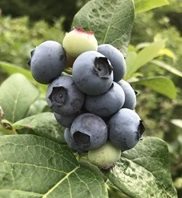 Below are the PYO orchards and farms for blueberries that we know of in this area. Not all areas have blueberries orchards or farms that are open to the public. If you know of any others, please tell us using the add a farm form!
Below are the PYO orchards and farms for blueberries that we know of in this area. Not all areas have blueberries orchards or farms that are open to the public. If you know of any others, please tell us using the add a farm form!
Remember to always check with the farm's own website or Facebook page before you go - or call or email them if they don't have a website or Facebook page. Conditions at the farms and crops can change literally overnight, so if you want to avoid a wasted trip out there - check with the farm directly before you go! If I cannot reach them, I DON'T GO!
PLEASE report closed farms, broken links and incorrect info using the "Report Corrections" form below.
Derbyshire
Leicestershire
-
Grange Farm Soft Fruit - strawberries, Raspberries, Green
and Red Gooseberries, Red and Blackcurrants, blueberries, Blackberries
and Broadbeans
Copston Magna, near Wolvey, Hinckley, LE10 3HE. Phone: 1455 220572. Email: enquiries@grangefarmcopston.co.uk. Open: Tuesday to Saturday from 9 am to 6 pm, Sunday from 9 am to 5 pm. Directions: We are situated in the peaceful village of Copston Magna off the A5 not far from Nuneaton, Hinckley and Lutterworth. Grange Farm Soft Fruit is only 5 minutes from the M69 and 3 minutes from the A5. We are situated in the small village of Copston Magna near Wolvey within easy reach of Nuneaton, Hinckley, Lutterworth, Rugby, Coventry (all about 15 to 20 minutes drive) and Leicester (30 minutes from the centre). For SAT NAV users our postcode is LE10 3HE. From M69 Junction1 Roundabout: Either: -- Take the A5 towards Lutterworth and at the top of the hill (High Cross) turn right and immediate right again into Copston Magna and follow our signs or -- Take the B4109 towards Wolvey, then the first left towards Lutterworth, straight over the roundabout following our directional signs*. Half a mile on the left hand side is the sign for Grange Farm and the turning for Copston Magna. Please drive carefully as you approach the village. Our typical season is: Strawberries and Gooseberries - mid-June to beg August. The family started growing soft fruit in the 1970s and we are now the third generation to carry on this tradition. You can come and enjoy picking your own Strawberries, Raspberries, Green and Red Gooseberries, Redcurrants and Blackcurrants, blueberries, Blackberries and Broad Beans. Surrounded by beautiful countryside many customers remark that they find their visit extremely relaxing and therapeutic. Our Strawberries are grown on tabletops under cover to protect the crop from adverse weather which provides high quality fruit and all weather picking. With our tabletop system there is no bending and fruit is easy to pick and accessible for all in any weather.
Blackcurrants and Redcurrants - end of June to mid July
Raspberries - end of June to mid August
Blueberries and Blackberries - mid July to mid August
The season is dependent on the weather and some years we are open as early as the begining of June. (UPDATED: 04 October 2019, JBS)(ADDED: July 9, 2015, JBS)
Lincolnshire
-
Peaks Top Farm - Strawberries, gooseberries, blueberry
juke, apples, blackberries, redcurrants, blackcurrants, plums, rhubarb
Hewitt's Ave, new waltham, grimsby, NA DN36 4RS. Phone: 01472 812941. Email: info@peakstopfarm.com. Open: 10am-5pm daily; Our fruit season usually starts mid June until late July depending on the weather. Strawberries and gooseberries begin the season, with the raspberries, red and blackcurrants towards the end of June through July.. Directions: See their website for directions. Click here for a map and directions. Payment: Cash, only.. Eggs, summer fair, vegetables, fishing ponds, fruit wines We have been growing soft fruit for sale on the farm for the past 30 years. The soft fruit at Peaks Top Farm includes over 2 hectares of strawberries, a ‘table-top’ strawberry growing system, 5 poly-tunnels plus outdoor bush and cane fruit such as raspberries, black and redcurrants along with 3 varieties of gooseberries. New for 2016 we have planted a variety of blueberries called Juke. We welcome all members of the public to come to the farm and ‘pick your own’ fruit. At a little extra cost we have a ready picked service for all our fruit if you don’t have the time to pick your own. Our blackberries come into fruit later in the year; generally around August. Once October arrives we move into our orchard to begin picking apples and plums. We grow 4 varieties of apples (Scrumptious, Russet and Falstaff eaters and Bramley cooking apples). The 2 varieties of plums are Victoria and Czar. Depending on yield we also aim to have rhubarb available in season. (UPDATED: June 21, 2018, JBS) (ADDED: July 11, 2017, Suggested by a visitor)
A visitor writes on July 11, 2017: "I've not been but driven past and wished i had and thought it was a shame it was missing from your list." -
Willows Farm Fruit - blackberries, blueberries, currants (red and
black), gooseberries, loganberries, plums, pumpkins, raspberries, rhubarb,
strawberries, tayberries
A52 Chapel St Leonards, Skegness, Lincolnshire, PE24 5UB. Phone: 07771 696001. Email: david@willows-farm.com. Open: June, July, August;: 7 Days a week, 9 am to 6 pm. Directions: From Skegness take the A52 north towards Mablethorpe. We are situated approximately 1 mile north of Ingoldmells just before reaching Chapel St Leonards. As well as PYO crops we always have ready picked fruit available. We welcome orders for large quantities or special occasions. In the farm shop we also sell our own grown new potatoes, cauliflowers, cabbage, beetroot, carrots, peas, broad beans, sweetcorn and salads and pumpkins (October time). Our farm shop will be open from early June when we will have our first strawberries available along with the new potatoes and fresh vegetables. Raspberries and currants follow in early July. Our Sunday Car Boot Sales start in June and if you want to come and stay at Willows Farm we now have a small caravan site. We grow several different varieties of strawberries, raspberries, red, black and white currants, tayberries, blackberries and gooseberries, and now plums and cherries. Sample one as you Pick Your Own, or buy them freshly picked at our farm shop. Field grown and 'table-top' production - no bending, and wheelchair friendly! We also offer camping facilities along with a farm shop. (UPDATED: May 14, 2019, JBS)
Northamptonshire
Nottinghamshire
Blueberry Picking Tips, Recipes and Information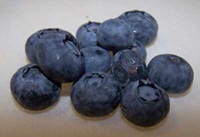
Blueberries are one of the easiest fruit to prepare and serve. There's no peeling, pitting, coring or cutting. They have few natural pests, (other than birds), so pesticides are generally unnecessary! This year's crop is fantastic (see related news story), thanks both to the weather and to more farms planting more blueberry bushes due to increased consumer demand over the past few years as more studies proclaim the anti-oxidant and other health properties of blueberries.
Click here to find a local Blueberry Festival (usually held between April and July).
If you are looking for information about a similar
berry, the saskatoon (also called the June berry or Serviceberry)
see this page about
saskatoons.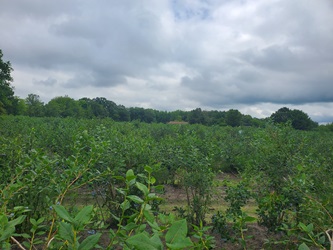
Picking tips:
Select plump, full blueberries with a light gray-blue color. A berry with any hint of red isn't fully ripened.
Ripening AFTER picking?
First, it is key to know that once picked, blueberries will NOT become any sweeter, nor will the flavor improve. The only change that occurs is the color. They will APPEAR to ripen, but it is only a color change, from white to green to rose to red to pale blue to fully blue. So, white and green colored blueberries will not "ripen" after they are picked; while blueberries that have already turned purple, red or blue-ish usually DO change color after they are picked (if they are kept at room temperature to "ripen").
As the blueberries ripen ON THE BUSH, the flavor goes from tastless to bitter to tasteless tart to tart blueberry flavor to sweet blueberry flavor.
Grocery stores sell blueberries that are tart, not sweet because they had them picked unripe by machine so they are very firm and can handled being bumped around in shipping. They may look good, but are not as tasty as those picked when actually ripe.
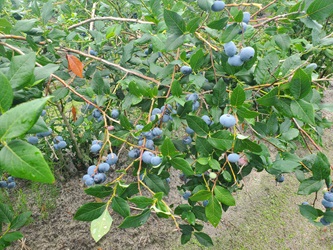
So, the key is, PICK ONLY RIPE BERRIES!
How to pick blueberries
Since blueberries hang on the bushes in bunches a but like grapes do, the easiest and fastest way to pick them is hold your bucket under them in one hand and with your other hand, cup a ripe bunch and gently rub them with your fingers. The ripe berries will drop into your bucket, while the unripe ones will remain attached to the bush.
When the bushes are at peak, I can easily pick 2 gallons per hour (if I'm not being distracted by the kids and the sun isn't too hot!). A newbie might do 1 gallon per hour.and at the beginning or end of the season it takes more time as the berries are not as plentiful nor concentrated in clusters.
Tips for storing blueberries after harvesting:
- Once picked, don't place the berries, still warm from the sun, in a closed bag or container. Leave the container open so moisture doesn't form in the container.
- Don't wash berries until just before using, to prevent berries from becoming mushy.
- Chill berries soon after picking to increase shelf life. Store your fresh blueberries in the refrigerator as soon as you get them home, without washing them, in a covered bowl or storage container. If refrigerated, fresh-picked blueberries will keep 10 to 14 days.
- Freeze berries in freezer containers without washing to keep the skins from toughening. Place berries one layer deep. Freeze, then pour the frozen berries into freezer containers. Because unwashed blueberries freeze individually, they can be easily poured from containers in desired amounts. Remember both frozen and fresh berries should be rinsed and drained just before serving. Just before using, wash the berries in cold water.
Blueberry Measurements and Conversions
Keep in mind that blueberries vary considerably in density and moisture content, so these ranges are approximates.
-
1 gallon of blueberries weighs about 7.5 lbs or (4 liters of blueberries is about 3.5 kg)
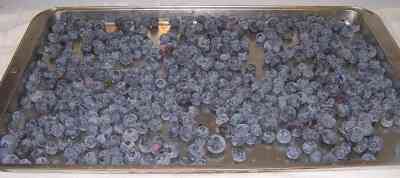
-
1 pint of fresh blueberries weights about 3/4 of a pound. (1 liter of blueberries is about 700 grams)
-
1 pound of fresh blueberries is usually between about 2 and 3 cups of berries.
-
It takes about 4 cups (about of blueberries to make a blueberry pie (see this fantastic and easy blueberry pie recipe)
-
A normal batch of blueberry preserves, jam or jelly requires 5 pints of berries.
-
Blueberries do come in a variety of sizes from small (190-250 berries per cup) to extra large (<90 berries per cup).
Blueberry Recipes, Canning and Freezing Blueberries
Recipes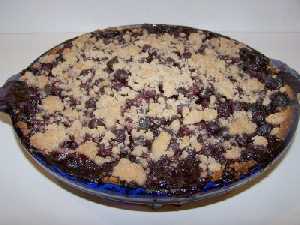
- The world's best Blueberry pie, recipe and directions and illustrated!
- Blueberry buckle coffee cake: illustrated directions for this great crumb-topping blueberry coffee cake
- Other easy directions to make blueberry desserts: cobblers, etc.
Canning, freezing and other blueberry recipes:
- How to Freeze Blueberries
- How to Can Blueberries
- How to Make Homemade Blueberry Jam
- How to make blueberry jelly
- How to make and can blueberry syrup (it works for strawberries, raspberries and blackberries, too)
- blueberry pie filling to use later,
- blueberry butter
Baking tips
If you have trouble with blueberries settling to the bottom of muffins and blueberry breads, try one or more of these tips:
- Coat them with flour before adding to the batter. Just gently shake the blueberries in a bag (plastic or paper) with 1/2 cup of flour, then dump them mix in a sieve to remove excess flour.
- It may just be that your batter is too thin. try making the batter a little thicker!
- Fill the muffin cups or baking pan up to 1/4 full with batter (which hasn't had blueberries added to it yet); then stir the blueberries into the remaining batter, and continue to fill the muffin cups or bread pan. The blueberries will start off higher in the mix!